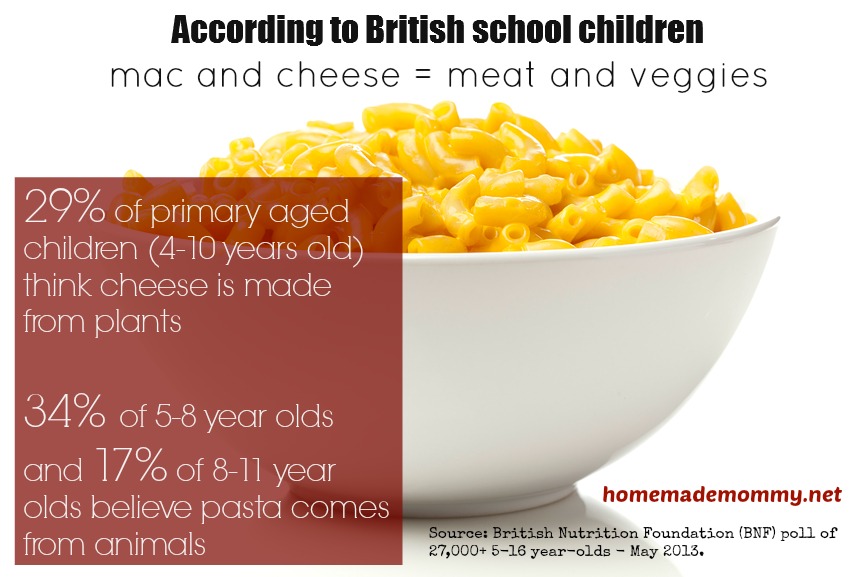Survey Shows Children Know Little About Food
Did you know that cheese comes from a plant? Did you also know that tomatoes grow under ground?
Apparently this is what children surveyed in the UK believe to be true! A recent survey conducted in the UK of more than 27,000 children shows that children know very little about food. The picture is grim…of the children surveyed:
- 29% of primary aged children (4-10 years old) think cheese is made from plants
- 34% of 5-8 year olds and 17% of 8-11 year olds believe pasta comes from animals
- 18% of primary school children believe fish fingers come from a chicken
- 80% of the school children do not eat enough fruits and vegetables (less than 4 portions per day)
- 21% of 4-10 year olds reported never visiting a farm!
I am not sure why I am surprised. If this survey had been conducted in the US it might even be worse. We teach kids to read, to write, and to do math, but why do we find it so difficult to teach them about the food they eat multiple times a day?
Talk to your kids about real food
I talk to my daughter about real food and the impact it has on her body and her life day in and day out. I want her to know that the meat on her plate came from a cow, lamb or chicken and that they had to die so she can eat. I want her to know that milk makes cheese and butter and that it comes from a cow.
We play a fun guessing game on the playground where I bring up a category (like ‘dairy’) and then name a letter. She has to guess what dairy item I am thinking about. For example – ‘M’ is for ‘milk’. We have even started in on spices and on cuts of meat. Yes, she asks me very insightful questions about how we get the rib from a cow. I have to provide the best answer I can which is that we respect the animals but that we do raise farm animals for food. She and I talk about the difference between pets and farm animals we eat.
I do not see this as a disturbing topic – this is LIFE.
How we talk to our children matters
We teach them about the semantics as well as provide guidance on our values. How you do this is your choice. Do I agree with this video which has gone a bit viral on the Internet promoting vegetarianism?
While these are not my values because we do eat meat, I do welcome any type of discussion with children about how food gets to their plate. This mother entertained a discussion with a very young child about her values. That is the point. She did not skirt the issue. She tackled it and she taught her child something about his food.
It would be nice if there was a Disney movie about living on farm and seeing your favorite ‘pet’ farm animal being butchered and then eating it that night for dinner to facilitate this conversation, but that just is not the case. Parents have to do the hard work of making the invisible visible to their children about their food. Food does not come from a ‘grocery store’. Without farmers or foragers there would be no food.
Provide life experiences for your children
Participate in nature.
When I was young, I used to go on fishing trips with my dad. When we caught a fish, we gutted it, then cooked it on the fire, and then ate it for dinner. My dad would show me if it was a male or a female by looking for fish eggs. That is some of the best fish I have ever tasted to this day and I will never forget those experiences with nature.
Take a field trip to a local farm.
My daughter’s school recently took the children on a field trip to a local teaching farm. The children were able to see all kinds of animals and even watch a cow milking demonstration. We also take her to pick up our raw milk and to the farmers markets each week.
Have your kids help you cook!
The one bright spot in the British poll is that 84% of primary school aged children and 73% of secondary school aged children said they would like to cook more! 85% of all of the children surveyed said they enjoyed cooking. Cooking teaches math, reading, and science all at once. Cooking is a great activity because you accomplish much more than making a mess – you get a meal out of it.
These experiences are important for young children. Otherwise, they are left to imagine for themselves where their food comes from.
Do you take your kids on nature or farm excursions? What did you recently learn about your food and where it comes from?

